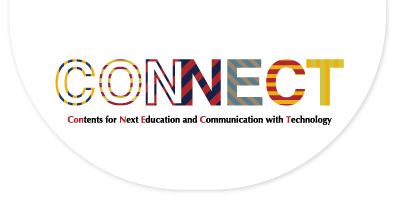TopicsSession Report
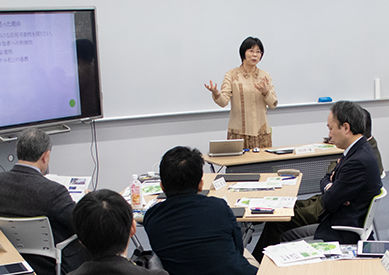
Campus-Wide Workshop
"Explore the Potential of the Sustainable Extension of Teaching Originating from Kyoto University"
Published online: October 9, 2020
Published online: May 1, 2020 (Original article)
October 9, 2020 (English article)
On January 29, 2020, the Committee for the Promotion of Educational Content Utilization held a workshop for faculty and staff members, entitled "Explore the Potential of the Sustainable Extension of Teaching Originating from Kyoto University."
26 faculty and staff members from 17 departments participated in the workshop. Prior to discussions, two teachers gave two examples in the university of fee-based educational programs that use ICT and are open to anyone to enroll.
Subsequently, the participants made 5 small groups to discuss how projects could continue to grow against the backdrop of increasing demands on the university coupled with limited available resources.
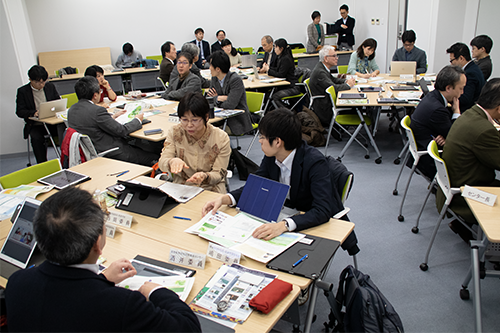
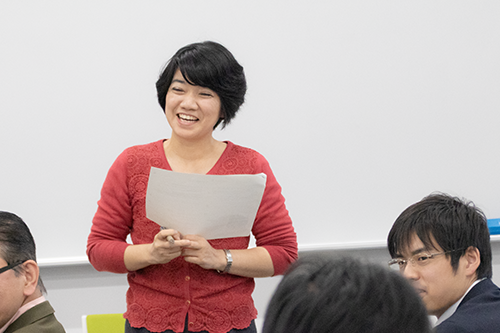
Left: Participants having heated discussions.
Right: Associate Professor Taguchi, Center for the Promotion of Excellence in Higher Education, moderating the workshop.
Program
Wednesday, January 29, 2020, at Room 201, Yoshida-South Building No. 1
Hosted by: Mana Taguchi, Associate Professor, Center for the Promotion of Excellence in Higher Education
Topic 1
11:00~11:15 Online Course "Educational Evaluation Basic Course"
Kanae Nishioka, Professor, Graduate School of Education
Topic 2
11:15~11:30 FCME Approach
Shoko Tani, Program-Specific Researcher, Medical Education Center
Group Work and Discussions
11:30~12:00 Explore the Potential of Sustainable Extension of Teaching Originating from Kyoto University
Topic 1
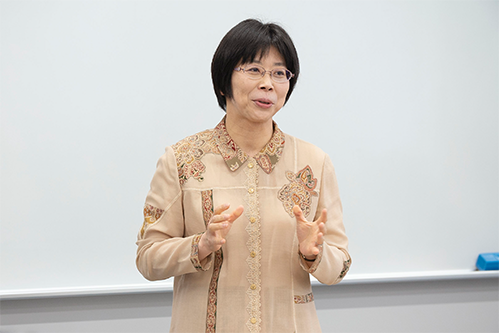
Professor Nishioka at the presentation
In this workshop, Professor Nishioka of the Graduate School of Education first introduced the topic of the online course, "Educational Education Basic Course." This course opened in academic year 2019 as part of the E.FORUM Nation-Wide School Leader Training provided by the Graduate School of Education. The program consists of 5 online lectures. A certificate of completion is awarded to students who have viewed all lecture videos, completed a mini-exam, and achieved a passing score.
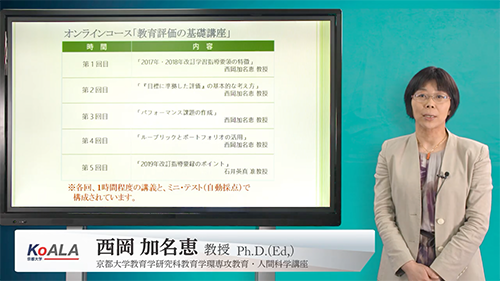
Online lecture by Professor Nishioka in the "Educational Education Basic Course"
In academic year 2019, the first year of the program, 45 people participated in the course. They were mostly practicing teachers. The majority of the participants were from remote places, as well as some from Kinki, Chugoku, Shikoku, and Chubu districts.
According to Professor Nishioka, advantages of the online course include its suitability for providing basic knowledge and automatic grading of the mini-exams. Once set up, the course can be continuously offered without making substantial revisions. Moreover, unlike on-campus courses, the course is not affected by impacts of natural disasters.
Topic 2
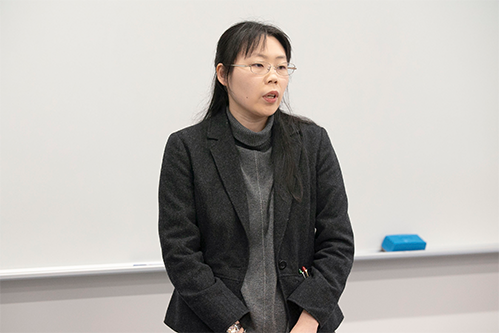
Dr Tani at the presentation
Dr. Tani, Program-Specific Researcher at the Medical Education Center, gave an example of the Foundation Course for Medical Education (FCME), an educational program for practicing physicians.
This offering began in academic year 2015 as an Advanced Problem-Solving Medical Human Resources Training Program organized by the Ministry of Education, Culture, Sports, Science and Technology. After the ministry ended grants the program at the end of academic year 2018, the center continued providing the course as the organizer. FCME is principally for physicians with experience in teaching medical students and/or giving guidance to medical interns.
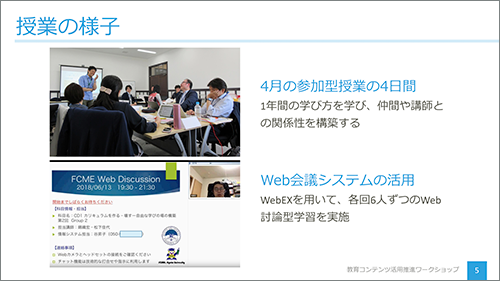
Lecture given in FCME (from the presentation slides)
The training program combines hands-on classes offered as triannual intensive lectures totaling 12 days, and semi-monthly web-based, debate-style two-hour learning sessions. Participants receive a certificate of completion by attending the course for at least 120 hours and getting a passing grade in each subject. Thus far, the number of applicants has exceeded capacity every year. Even in fiscal year 2019, the first year the program started to charge a course fee due to the termination of grants from the Ministry of Education, Culture, Sports, Science and Technology, the program received many applications.
Trainees are selected to maximize diversity in field of medicine, age, gender, district of residence, and other factors. Moreover, various ideas are incorporated into the provision of online classes in respect for diversity.
Group Work and Discussions
With these two examples in mind, the small group participants discussed how to implement sustainable and evolutionary educational programs from the perspectives of their departments and areas of specialization.
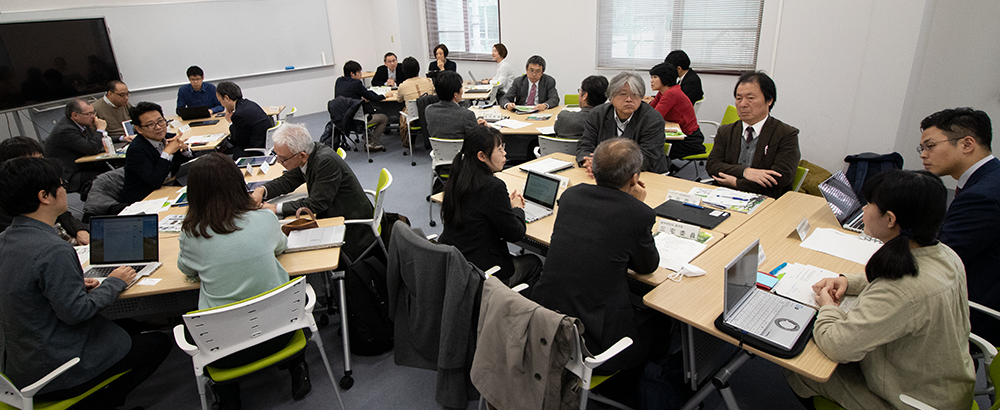
The discussions were heated, focusing on three topics:
- ways to make programs profitable;
- devices and experiences associated with program management;
- and prospects and ideas for the future.
The one-hour workshop ended after so lively discussions that the volume of one group occasionally deafened the others.
- Excerpts from Group Discussions
-
-
【Group A】
- Regarding project continuity, it is difficult to move the program into the black immediately after startup. It would be necessary to have a moderately long-term viewpoint.
- It is necessary to update the program every year, which is not an easy task.
- (In response to these comments) One idea is to use ICT or other similar measures to reduce the workload.
- Both projects the presenters reported on are significantly important. However, from a business perspective, it is regrettable that the projects are not profitable enough.
- (Putting aside the reported examples) It is difficult to continue such kind of projects as a business, even with many prospective trainees.
- One of the advantages of being on campus is that, for example, participants can foster mutual connections through casual meetings. There should be an actual need for hybrid-style training that combines both online and on-campus programs.
- Our department has already opened some courses on KoALA (Kyoto Univesity's SPOC). In the same platform, holding programs for some 1000 students in a particular area is already under planning. We will explore how to make the programs profitable, seeking the availability of Kyoto University Original Co., Ltd.
- It was the first time for me to hear about the profit model. Practically speaking, it would probably be necessary to discover driving customer needs.
- One idea could be a hybrid style program, incorporating an online program into an existing one. For example, trainees could come to Kyoto on the last day of the program after completing classes online. This style could work in the context of high school-college articulation, as well as recurrent education.
- Some graduates certainly wish to earn a doctoral degree while working. Incorporating online classes should be effective in such cases. It is certain that, if highly motivated, these students will not drop out from classes, even if the program is provided online.
- Regarding content development for online classes, the content for undergraduates would stay fresh for a relatively long time. However, for graduate students, it is necessary to update the content more frequently. There should probably be a difference between these types of content in terms of the effort required to develop them. For graduate student content, developing platforms and schemes should probably be more important.
- Regarding programs intended to issue a certificate of completion for specialists, I have heard about one program designed for veterinarians. Trainees watch 15 video clips and solve exercises. The program concludes with an on-campus session. Although the program fee is relatively high, I have heard that demand for the program is also high because it is immediately useful for career enhancement.
- Are incentives, such as qualifications and certificates of completion, essential for attracting course participants?
- (In response to the above question) Participants will come if there are factors that motivate them, even without qualifications. I have heard about an overseas example of a MOOC on the programming language Python. Course fee revenues for this MOOC were several dozens of millions of Japanese yens, which the college and the instructor shared equally.
- (In response to the above discussion) Even if a program on voluntary basis is successful at the beginning, it should become difficult for the instructor to continue in several years. To continue the program, a tangible incentive should be in place. In this regard, institutional improvements are required.
- (In response to the above discussion) Regarding institutional constraints, by incorporating Kyoto University Original Co., Ltd., it could probably be possible to design programs relatively flexibly.
【Group B】
【Group C】
【Group D】
【Group E】
